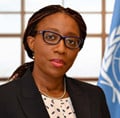IMF Seminar: Averting a COVID-19 Debt Trap
Overview
IMF Seminar: Averting a COVID-19 Debt Trap
The pandemic has led to an increase in debt level in most countries, as economic activity collapsed, and governments acted to provide economic and social support. Many countries had already elevated debt levels when the pandemic hit. Tackling debt vulnerabilities is critical to prevent divergent recoveries. The panel explored ways to contain debt risks and avert a COVID-19 debt trap.
Key Points:
- Dangers of the debt trap. Panelists agreed that the mounting public debt is a major risk to the global economy. Georgieva stressed the dangers stemming from divergent recoveries as emerging market economies and low-income countries are burdened by limited fiscal space and high debt levels. Songwe highlighted that some African countries are facing not only a debt trap but also a poverty trap, as it is getting increasingly difficult for many people to escape poverty
- Ways to avert the debt trap. Georgieva stressed the importance of providing comprehensive support to low-income countries and the need to mobilize domestic resources. El-Erian noted the need to focus on promoting growth and ensuring better burden sharing in timely and constructive debt restructurings. Songwe emphasized four critical components to avert the debt trap: new liquidity; better transparency in public debt; private sector involvement; and recapitalizing the MDBs.
- Managing the debt problem. Panelists agreed that there was a need to bring all creditors together to manage the debt problem. Songwe noted the changing composition of debt and recommended to focus on the most vulnerable countries. El-Erian suggested designing measures to avoid freeriding of the private sector and official creditors not participating in the burden sharing. Georgieva called for early action to help countries under debt distress to return to sustainable growth.
Quotes:
“We have to look at all instruments at our disposal and it has to be a comprehensive support for these countries, and countries themselves have to step up”. Kristalina Georgieva
“I fear that we may face a lost decade to a set of countries in Africa and in Asia.”. Mohamed El-Erian
“It is not so much a debt trap. It is a poverty trap or doubling down of the poverty trap”. Vera Songwe
Panelists


Mohamed A. El-Erian is the President of Queens’ College, Cambridge, also serving as Chief Economic Advisor at Allianz, Chair of Gramercy Fund Management and the Rene M. Kern Professor of Practice at The Wharton School. He formerly served as chief executive and co-chief investment officer of PIMCO (2007-14). A columnist for Bloomberg Opinion and the Financial Times, he is a member of the boards of Barclays, UnderArmour and several non-profits. From December 2012 to January 2017, Dr. El-Erian chaired President Obama’s Global Development Council. Prior to PIMCO, he was an international civil servant at the IMF in Washington DC for 15 years and, for two years, president and CEO of Harvard Management Company, the entity that manages Harvard’s endowment.
He was named to Foreign Policy’s list of “Top 100 Global Thinkers” for four years in a row and has published widely on international economic and finance topics. His 2008 book, "When Markets Collide," was a New York Times and Wall Street Journal bestseller, won the Financial Times/Goldman Sachs Business Book of the Year and was named a book of the year by The Economist and one of the best business books of all time by the Independent (UK). His 2016 book, "The Only Game in Town: Central Banks, Instability and Avoiding the Next Collapse," was also a New York Times bestseller, was listed by Inc.as one of the "25 of the Most Inspiring Books Everyone Should Read."
He holds a master's degree and doctorate in economics from Oxford University and received his undergraduate degree in Economics from Cambridge University.

Vera Songwe is the Under-Secretary-General of the United Nations and Executive Secretary of the Economic Commission for Africa (ECA). Upon her appointment, she became the first woman to lead the institution in its 60-year history.
As Executive Secretary, Songwe’s reforms have focused on “ideas for a prosperous Africa”, and have brought to the fore critical issues of macroeconomic stability, development finance, private sector growth, poverty and inequality, the digital transformation, trade and competitiveness.
She was listed as one of Africa’s 50 most powerful women by Forbes in 2020 and named as one of the ‘100 Most Influential Africans’ by Jeune Afrique in 2019. In 2017, New African Magazine listed her as one of the ‘100 Most Influential Africans’ and the FT named her one of the ’25 African to watch’ in 2015. Songwe is acknowledged for her long-standing track record of providing policy advice and her wealth of experience in delivering development results for Africa. She has written extensively on development and economic issues including on debt, infrastructure development, fiscal and governance issues. She is well published and contributes to the development debate across a broad spectrum of platforms including in the Financial Times.
Prior to ECA, she held a number of senior leadership roles with the International Finance Corporation and World Bank.


